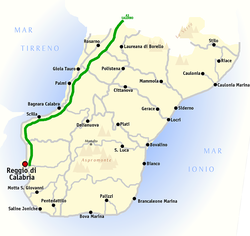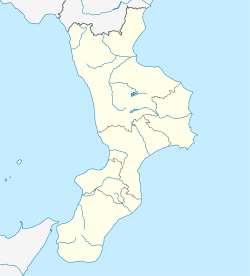San Luca
San Luca
Ághios Lukás (Greek) | |
|---|---|
| Comune di San Luca | |
 View of San Luca | |
 Map of the province of Reggio Calabria | |
| Coordinates: 38°9′N 16°4′E / 38.150°N 16.067°E | |
| Country | Italy |
| Region | Calabria |
| Metropolitan city | Reggio Calabria (RC) |
| Frazioni | Ientile, Polsi, Ricciolio, Stranges, Vorea |
| Government | |
| • Mayor | Bruno Bartolo |
| Area | |
| • Total | 104.2 km2 (40.2 sq mi) |
| Elevation | 250 m (820 ft) |
| Population (Dec. 2007)[2] | |
| • Total | 4,126 |
| • Density | 40/km2 (100/sq mi) |
| Demonym | Sanluchesi |
| Time zone | UTC+1 (CET) |
| • Summer (DST) | UTC+2 (CEST) |
| Postal code | 89030 |
| Dialing code | 0964 |
| Patron saint | St. Luke the Evangelist |
| Saint day | October 18 |
San Luca is a comune (municipality) in the Province of Reggio Calabria in Italy, located about 100 kilometres (62 mi) southwest of Catanzaro and about 35 kilometres (22 mi) east of Reggio Calabria. The town is situated on the eastern slopes of the Aspromonte mountains and in the valley of the Bonamico river. The village has long been known as a stronghold of the 'Ndrangheta, a Mafia-type criminal organisation based in Calabria, with an ongoing clan based power struggle dubbed the San Luca feud.
The Sanctuary of Our Lady of Polsi is located 10 kilometres (6 mi) from San Luca. It has long been the 'Ndrangheta's meeting place.
History[edit]
San Luca was founded on October 18, 1592, by Prince Sigismund Loffredo and named after Saint Luke the Evangelist, who became the patron saint of the town. It was populated by refugees from the old town of Potamia, which was destroyed by landslides.[3] San Luca became a comune in 1811, and was hit by floods and landslides in 1951, 1953, and December 1972.[4]
Journalist and author Corrado Alvaro grew up in San Luca in the early 1900s, a time when illiteracy was near 100 percent and the town had no drinking water. The women went to fetch water with the casks on their heads at a well nearby. The town was fairly isolated; there was no road to the coast and the only way was on foot. Many inhabitants joined the Italian diaspora to escape the extreme poverty.[5]
Stronghold of the 'Ndrangheta[edit]
San Luca is considered to be the stronghold of the 'Ndrangheta, a Mafia-type criminal organisation based in Calabria. According to a former 'ndranghetista, "almost all the male inhabitants belong to the 'Ndrangheta, and the Sanctuary of Our Lady of Polsi has long been the meeting place of the affiliates, known as the Crimine."[6] At least since the 1950s, the chiefs of the 'Ndrangheta locali have met regularly near the Sanctuary of Our Lady of Polsi during the September Feast. In 1969 the police raided a meeting near the sanctuary and captured more than 70 'ndranghetisti, while others managed to escape.[7]
The historical preeminence of the San Luca family is such that every new group or locale must obtain its authorization to operate and every group belonging to the 'Ndrangheta "has to deposit a small percentage of illicit proceeds to the principale of San Luca in recognition of the latter’s primordial supremacy."[8] San Luca, in the words of a study published in 2005 by Italy's domestic intelligence service, is "the cradle of [the 'Ndrangheta] and its epicentre".[9]
In 1991, the San Luca feud, a war between the Pelle-Vottari-Romeo and Strangio-Nirta clans began and resulted in several deaths. It carried into Germany in August 2007 when six men were shot to death in front of an Italian restaurant in Duisburg.[10][11]
In May 2023, the Italian police made numerous arrests in San Luca as part of an international razzia against the 'Ndrangheta.[12]
Demographic evolution[edit]

Notable people[edit]
- Corrado Alvaro (1895–1956), journalist and writer, born in San Luca in 1895. His hand-written notes and other personal belongings are now kept in the house where he was born by the Corrado Alvaro Foundation.[13]
- Antonio Pelle (1932–2009), also known as Ntoni Gambazza, a historically significant 'Ndrangheta boss
- Antonio Nirta (1919–2015), a historically significant 'Ndrangheta boss
References[edit]
- ^ "Superficie di Comuni Province e Regioni italiane al 9 ottobre 2011". Italian National Institute of Statistics. Retrieved 16 March 2019.
- ^ All demographics and other statistics: Italian statistical institute Istat.
- ^ (in Italian) Storia Archived 2010-09-19 at the Wayback Machine, Fondazione Corrado Alvaro
- ^ (in Italian) San Luca
- ^ (in Italian) Il paese di Alvaro, Fondazione Corrado Alvaro
- ^ Paoli. Mafia Brotherhoods, p. 29
- ^ Paoli. Mafia Brotherhoods, p. 59
- ^ Paoli. Mafia Brotherhoods, p. 29-30
- ^ Hooper, John (2007-08-17). "Silence on the streets of Calabria's mafia capital as deadly feud crosses borders". The Guardian. ISSN 0261-3077. Retrieved 2023-05-07.
- ^ "How the tentacles of the Calabrian Mafia spread from Italy". The Times & The Sunday Times. 15 August 200. Retrieved 2023-05-07.
- ^ Six Italians Killed in Duisburg, Spiegel Online, 15 August 2007
- ^ "Italy's 'Ndrangheta targeted in police raids across Europe". BBC News. 2023-05-03. Retrieved 2023-05-07.
- ^ San Luca: the story and traditions Archived 2011-07-26 at the Wayback Machine, Movimento Donne San Luca e della Locride
External links[edit]
- All In The Famiglia: Cracking omertà in Calabria, by Bruce Livesey, The Walrus Magazine, May 2008.
- Paoli, Letizia (2003). Mafia Brotherhoods: Organized Crime, Italian Style. New York: Oxford University Press. ISBN 0-19-515724-9.





